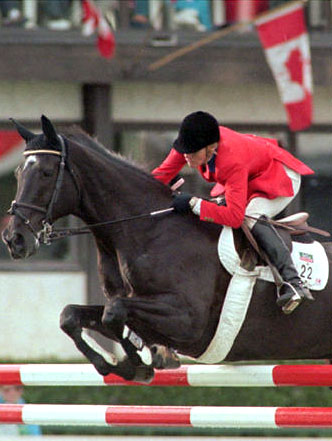Olympian Beth Underhill was an accomplished singer long before she became a famous equestrian.
A silver medal for best Canadian vocalist earned at the age of 14 from the Royal Conservatory of Music is testament to the hours she put in to be the best in her discipline. That music training also stood her in good stead when later in life she performed at the 1992 Olympics in Barcelona and won silver medals at the 1991 and 1999 Pan American Games.
“There are remarkable similarities between performing music and sport,” says Underhill, who was the first woman to win the Canadian World Cup qualifying league in 1993. “There is that same self-discipline, motivation and passion.”
According to the Royal Conservatory of Music, a remarkable 19 of the 277 Canadian Olympians currently in London have studied or taken exams at the Toronto school.
When the Canadian women’s eight rowing team won a silver medal on Thursday, no one was happier than the faculty at the conservatory.
That’s because three of the rowers were former students of Canada’s most prestigious music school, including Natalie Mastracci of Thorold, Ont., Lauren Wilkinson of North Vancouver, and Winnipeg’s Janine Hanson.
What makes that feat even more astounding is that only a day earlier, the Canadian men’s eight rowing team also won the silver in spectacular fashion. As it happens, two of the team members are also Royal Conservatory alumni: Jeremiah Brown of Cobourg, Ont., and Doug Csima from Oakville.
That makes five members, making up almost a third of the combined men’s and women’s eight teams, who were music students.
So what’s the connection?
It seems that the discipline of playing together in harmony will serve you well in athletics — and it doesn’t hurt if you’re on a rowing team. (Olympic rowing medallist Silken Laumann is an alumna.)
“It’s really fascinating to see how athletes and musicians perform,” says James Anagnoson, dean of the elite Glenn Gould School at the conservatory. “The physical skill and stamina needed, the hours of practice, the dexterity and level of technicality required to perform at a high level are all key.”
Anagnoson says he was watching the rowing finals and experienced “an incredible, exhilarating thrill; it was a lot like the rush you get from music.”
He noticed the calmness of the rowers while under pressure. The catchphrase for the conservatory, naturally, is that the “finest instrument is the mind.”
“So much is mental,” says Anagnoson. “When you are synchronizing with others there’s no room for panic. My advice to young artists is that the whole key to playing fast is to think slow. And you could see the rowers doing that.”
Rower Michael Braithwaite is at his first Olympics in the men’s double sculls event in London.
The 25-year-old began taking piano when he was 7 years old and finished grade 10 piano at the Royal Conservatory of Music in his last year of high school.
Braithwaite doesn’t get a chance to play piano much any more while he’s training, but he dabbled in impromptu band performances at the University of Toronto.
“I think it’s helped with the rhythm. The other thing I’ve heard (that is) helpful — I’m in the sculling group — scullers have an oar in each hand. (They say) pianists always make good scullers because of their awareness of their hands and their fingers on both sides,” he told the Star’s Shawna Richer.
Classically trained pianists, cellists and clarinetists are all part of the Canadian Olympic team. They include hammer throw champion Heather Steacy and fencer Sherraine Schalm.
“The skills are transferable,” says Jesse Cooney, a gymnast and member of the 2010 world champion coed Team Canada Cheerleading squad.
Cooney, a staff member at the conservatory and co-ordinator for the Carnegie Hall Royal Conservatory Achievement Program, started playing the piano at the age of 7. He took his first exams at the conservatory when he was 10.
“There is a sense, an attitude that is instilled in music competition that you shouldn’t settle for less than the best from yourself,” says Cooney. “And in music there is relentless preparation, just like in sports. You’re trying to make sure there is no room for error.”
As in sports, technique is everything.
Proper execution of breathing and placement is key. And familiarity with performing in front of live audiences, whether you’re a musician or an athlete, certainly helps.
Underhill’s preparation for sport hasn’t changed much from when she performed in front of live audiences as a singer. She still takes some quiet time to sit down and visualize her performance.
“I would also go through a checklist of what I would do if I forgot the words to a song or if I missed a jump,” she says.
Olympic sport is the ultimate pressure cooker because you are not just representing yourself, but the entire country. Music helps prepare an athlete for that challenge, Underhill said.
“Music training helped me to have a much more confident, stronger attitude, not just in riding but in life as well.”
London, ON – 2012

